Food for thoughts
Sept. 4, 2025
Thesaurus : Doctrine

► Full Reference: B. Frydman & A. Briegleb, "L'obligation de compliance en Droit global ("Compliance Obligation in Global Law)", in M.-A. Frison-Roche (ed.), L'Obligation de Compliance, Journal of Regulation & Compliance (JoRC) and Éditions Lefebvre - Dalloz, coll. "Régulations & Compliance", 2025, forthcoming.
____
📕read a general presentation of the book, L'Obligation de Compliance, in which this contribution is published
____
► English summary of this contribution (done by the Journal of Regulation & Compliance - JoRC): The authors stress that the Contracts Law and Tort Law are essential in Compliance Law, particularly in its global legal perspective, since it goes beyond the legal systems of States and develops new normativities, at the level of each company, but also allows a new expression of public power through the Monumental Goals that Compliance Law claims to achieve globally. The weaker the States, the greater the delegation to the first level is operating.
In concrete terms, the authors examine a series of situations in which various organisations use compliance techniques to appropriate global power over things or people, which has the effect, and sometimes the purpose, of reducing the freedoms of people controlled in this way. Thus CSR, which was initially non-binding, is now the source of binding obligations, and the moral obligation expressed in codes of conduct can become a civil obligation, as the Supreme Court of California decided in 2002 in the Nike case.
In addition, "Comply or Explain" clauses are now commonplace, allowing the person subject to the legislation not to comply if they can justify it, which is the basis of the many information reports that companies are now required to publish.
Then, returning to the issue of liability, particularly in the digital environment, the article stresses the importance of 'conditional immunity from liability', taking the view from the European DSA that certain operators, such as hosting providers, are not liable unless they take on obligations, such as monitoring functions on contents published.
Finally, with regard to the duty of vigilance, it tends for the first time to align the scope of "responsibility" with the scope of "power", moral responsibility thus becoming legal responsibility, which would be like a new responsibility for others.
The result of all this is an "obligation to regulate others".
________
🦉This article is available for people who follow the Professor Marie-Anne Frison-Roche teaching
Sept. 4, 2025
Thesaurus : Doctrine

► Référence complète : G. J. Martin, "Clauses et contrats, modalités de l’obligation de vigilance", in M.-A. Frison-Roche (dir.), L'obligation de Compliance, Journal of Regulation & Compliance (JoRC) et Éditions Lefebvre - Dalloz, coll. "Régulations & Compliance", 2025, sous presse
____
📕lire une présentation générale de l'ouvrage, L'obligation de Compliance, dans lequel cet article est publié
____
► Résumé de l'article (fait par le Journal of Regulation & Compliance - JoRC) : L'auteur se consacre à ce qui est souvent désigné comme les "clauses RSE" en ce qu'elles constituent une façon pour les entreprises de mettre en oeuvre leur Obligation de Compliance. Dans une pratique encore "balbutiante", les entreprises contractualisent ainsi leur aspiration éthique et leur obligation légale, définissant au passage plus précisément ce qu'est pour elle l'obligation de compliance et/ou de vigilance, notamment par des référentiels internes ou/et externes, en y associant des mécanismes d'évaluation, d'audit et de sanctions spécifiques, comme la résiliation.
En outre, le contrat organise l'articulation avec des clauses commerciales ayant un autre objet, Cela est d'autant plus requis que l'objet de ces clauses est aussi de "faire ruisseler" l'obligation légale au-delà du premier cercle contractuel. Le risque de déséquilibre devra être évité. Les clauses devront être précises et limitées, notamment au regard de l'espace et du temps.
Dans un second temps, l'auteur examine l'articulation du Droit commun des contrats et du Droit spécial de la Vigilance. En effet, après avoir posé que le contrat soit le moyen, et même le seul moyen, de transformer la soft Law en hard Law dans les relations entre les parties contractantes, l'auteur estime que si une telle clause figure dans un contrat commercial figurant dans une situation visée par la lo de 2017 (chaine de valeur, rapport société-mère et filiale) il y a cumul de qualités. Il en naît donc des conflits de compétence avec le Tribunal judiciaire de Paris et l'on peut regretter l'abandon de la solution retenue par la Cour de cassation ouvrant une option de compétence.
Une autre articulation difficile devra être faite en cas de nullité de la clause RSE, annulation que le juge de droit commun peut prononcer, suivant qu'elle sera estimée par le juge déterminante ou non d'autres clauses, voire du contrat. En cas d'inexécution de la clause, la rupture des relations commerciales peut être prononcée, mais l'on peut penser qu'un préavis doit être respecté.
Enfin si l'objet même du contrat est l'exécution de l'obligation de vigilance, il faut que cela n'équivaille pas à une délégation qui anéantirait le principe légal d'une responsabilité personnelle.
_________
🦉Cet article est accessible en texte intégral pour les personnes inscrites aux enseignements de la Professeure Marie-Anne Frison-Roche
________
Sept. 4, 2025
Thesaurus : Doctrine

► Référence complète : M. Françon, "L’intensité du devoir de vigilance dans le secteur bancaire", in M.-A. Frison-Roche (dir.), L'Obligation de Compliance, Journal of Regulation & Compliance (JoRC) et Dalloz, coll. "Régulations & Compliance", 2025, sous presse.
____
📕lire une présentation générale de l'ouvrage, L'Obligation de Compliance, dans lequel cet article est publié
____
► Résumé de l'article (fait par le Journal of Regulation & Compliance - JoRC) : L'auteur développe le cas des opérateurs bancaire et d'assurance. Il insiste sur le fait qu'en matière bancaire et d'assurance, la vigilance consiste dans une obligation de traiter des informations, au besoin préalablement collectées, en vue de prévenir la survenance d'un risque systémique.
L'identification et la prévention du risque est une obligation de moyens renforcée qui, dans ce cadre, connaît des variations d'intensité. L'obligation est ancienne, alors que le devoir de vigilance est récent. Ce décalage dans le temps s'explique parce que la vigilance obligée est consubstantielle à l'activité même du banquier et de l'assureur et du fait du caractère systémique du secteur depuis toujours, ce qui produit une imbrication du droits dur et souple.
Les variations de l'intensité de l'obligation de vigilance tiennent quant à elles au fait qu'il y a deux types d'obligations : celles qui sont imposées dans l'intérêt de l'activité et du client et celles qui le sont dans l'intérêt de la stabilité du système. Les secondes sont beaucoup plus fortes que les premières. Elles pèsent aussi bien sur le banquier que sur le client. Ainsi les obligations en matière de blanchiment ont pour seul but l'intérêt général, le client ne pouvant se prévaloir des manquements de la banque (Com. 28 avril 2004). D'ailleurs, en matière de gel des avoirs, l'obligation de vigilance devient de résultat.
Dans l'intérêt général lui-même, l'intensité varie en fonction des buts poursuivis, engendrant des vigilances "standard, simplifiée, renforcée", en fonction du risque sous-jacent. En outre, des droits interférents font varier l'obligation, notamment la protection des droits à la protection des données personnelles, ou le droit à la non-immixtion du banquier. Enfin, interfèrent les obligations de vigilance pesant sur les tiers, y compris situés hors de l'Europe.
________
🦉Cet article est accessible en texte intégral pour les personnes inscrites aux enseignements de la Professeure Marie-Anne Frison-Roche
________
________

Aug. 29, 2025
Publications

🌐follow Marie-Anne Frison-Roche on LinkedIn
🌐subscribe to the Newsletter MAFR Regulation, Compliance, Law
🌐subscribe to the Video Newsletter MAFR Surplomb
🌐subscribe to the Newsletter MaFR Droit & Art
____
 ► Full Reference: M.-A. Frison-Roche, Compliance Law and Systemic Litigation, Working Paper, August 2025.
► Full Reference: M.-A. Frison-Roche, Compliance Law and Systemic Litigation, Working Paper, August 2025.
____
📝 This bilingual Working Paper is the basis of the article published in French "Droit de la compliance et contentieux systémique"
____
► Summary of this Working Paper: Legal systems have changed, and Compliance Law, in its uniqueness, reflects this change and plays a powerful role in it. New sets of compliance rules, particularly at European Union level, covering data protection (GDPR), anti-money laundering (AMLA), climate balance protection (CS3D) and banking and financial system sustainability (Banking Union), have been developed and imposed on large companies, which must implement them: alerts, mapping, assessment, sanctions, etc. These new regulatory frameworks only make sense in relation to their ‘Monumental Goals’: to detect systemic risks ex ante and prevent crises so that the systems in question do not collapse, but ‘last’. All the legal instruments in the corpus are normatively rooted in these monumental goals, which are the core that unifies Compliance Law (I).
The judge is the guardian of this new and highly ambitious regulatory framework, which relies on the practical ability of companies to implement it (II). Courts ensure that the legal technical provisions are applied in a teleological manner in each of these compliance blocks and that the regulations support each other, because all compliance regulations serve the same systemic goal: to ensure that the systems (banking, financial, climate, digital, energy, etc.) do not collapse, but sustains, and that present and future human beings are not crushed by them, but rather benefit from them. This unity is still little perceived because so meticulous regulations pulverise this profound unity of Compliance Law into a myriad of changing provisions. Entrusting the ‘regulatory mass’ to algorithms increases this fragmentation, making the whole even more incomprehensible and therefore impossible to handle. On the contrary, recognising the judge's place, i.e. at the centre, makes it possible to master this new branch of law. But the judge's sole function is not to restore clarity to a body of law covered by the dust of its own technicality.
There is a transfer to Litigation of the systemic object of Compliance Law. Indeed, the litigation that emerges from the new Compliance Law is itself fundamentally new, by transitivity. Indeed, the purpose of Compliance Law is to make systems sustainable (or resilient, or robust, depending on the terminology used). This results in litigation that is itself ‘Systemic Litigation’ (III), most often brought by an organisation against a systemic operator. The place and role of each party are transformed (IV).
____
🔓read the developments below⤵️

Aug. 15, 2025
Publications

🌐Follow Marie-Anne Frison-Roche on LinkedIn
🌐Subscribe to the Newsletter MAFR Regulation, Compliance, Law
🌐Subscribe to the video newsletter MAFR Overhang
____
 ► Full reference : M.-A. Frison-Roche, The role of Discretionary Jurisdictio in the judicial treatment of Compliance cases, working paper, August 2025.
► Full reference : M.-A. Frison-Roche, The role of Discretionary Jurisdictio in the judicial treatment of Compliance cases, working paper, August 2025.
____
📗This working document was prepared as a contribution to the collective book offered to Professor Dominique d'Ambra, to be published and given to her in October 2026.
____
► Summary of the working document : Based on the definition of Judicial Office, the procedural principles that derive from it and the consequent powers that judges exercise, the objet of this study is to measure the degree of discretion that exists in the judicial treatment of compliance, without direct consideration for the dispute between litigants. This part is very ignored, when it should be given top priority. Indeed, because Systems are involved in compliance cases brought before civil or commercial judges, we are seeing a development of this discretionary element in judicial fonction. Discretionary matters differ from unilateral discretionary procedures, and this discretionary element relates to what the judge examines, possibly in the context of a dispute.
The first part of this contribution therefore aims to describe the natural development of the discretionary power of the judge to deal with compliance cases brought before them. This role stems from the fact that, even when triggered by a dispute, what is submitted to the judge is a situation composed of a system, which cannot defend its interests before the civil or commercial judge in this Systemic Litigation arising from the very nature of Compliance Law and the Compliance Obligations it engenders on systemic entites. Moreover, it is the Future whose interests must be considered and protected, which the judge must do directly.
This leads to the second part of the contribution, calling for a rethinking of the procedure and the role of the Compliance Judge, so that ex gratia matters can be dealt with. The judge must therefore verify that there are no conflicts of interest between the litigants, including hidden ones, and must learn about the systems involved. The inquisitorial principle must therefore be strengthened. But at the same time, since the primary aim is not to settle a dispute but to resolve a systemic problematic situation, the judge must facilitate the movements of the parties, and the adversarial principle must also be strengthened. Must be encouraged this activation of a powerful and discretionary approach, not as an exception but as a principle fully articulated with a contentious principle, with the dispute being only a means used by the necessary parties to enable systemic compliance situations to be resolved.
________

Updated: July 25, 2025 (Initial publication: March 6, 2024)
Publications

🌐follow Marie-Anne Frison-Roche on LinkedIn
🌐subscribe to the Newsletter MAFR Regulation, Compliance, Law
🌐subscribe to the video Newsletter MAFR Surplomb
____
 ► Full Reference: M.-A. Frison-Roche, Compliance Obligation: build a compliance structure producing credible effects in the perspective of the Monumental Goals targeted by the Legislator, Working Paper, March 2024.
► Full Reference: M.-A. Frison-Roche, Compliance Obligation: build a compliance structure producing credible effects in the perspective of the Monumental Goals targeted by the Legislator, Working Paper, March 2024.
____
📝 This Working Paper is the basis of the article "Compliance Obligation: build a compliance structure producing credible effects in the perspective of the Monumental Goals targeted by the Legislator", in📘 Compliance 'Obligation de Compliance,
____
► Summary of this Working Paper: This article explains what companies' Compliance Obligation" is. Delving into the mass of compliance obligations, it uses the method of classification of those that are subject to an obligation of result and those that are subject to an obligation of means. It justifies the choice of this essential criterion, which changes the objects and the burden of proof of companies that are subject to an obligation of result when it comes to setting up "compliance structures" and are subject to an obligation of means when it comes to the effects produced by these compliance structures.
Indeed, this article goes on to analyse each body of regulations ("Sapins 2", "Vigilance", CSRD, CS3D, DSA, NIS2, DMA, DORA, AML-FT, ....) and the technical compliance obligations they impose, dividing them into obligations of result or obligations of means, depending on the text. This table of positive law thus drawn up, with reference to all the articles of the texts, shows that in positive law the Compliance Obligation has above all an evidential dimension, which is developed in the third part of the article: the company must show that it has put in place the compliance structures (obligations of result) required by the texts and it is up to third parties who criticise it for the unsatisfactory effects that these structures would have produced, according to them, to show that there is a fault or negligence on the part of the company (obligation of means).
Indeed, rather than getting bogged down in definitional disputes, given that Compliance Law is itself a nascent branch of Law, the idea of this contribution is to take as a starting point the different legal regimes of so many different compliance obligations to which laws and regulations subject large companies: sometimes they have to apply them to the letter and sometimes they are only sanctioned in the event of fault or negligence. This brings us back to the distinction between obligations of result and obligations of means.
Although it would be risky to transpose the expression and regime of contractual obligations to legal obligations put by legislation, starting from this observation in the evidentiary system of compliance of a plurality of obligations of means and of result, depending on whether it is a question of this or that technical compliance obligation, we must first classify them. It would then appear that this plurality will not constitute a definitive obstacle to the constitution of a single definition of the Compliance Obligation. On the contrary, it makes it possible to clarify the situation, to trace the paths through what is so often described as a legal jumble, an unmanageable "mass of regulations".
Indeed, insofar as the company obliged under Compliance Law participates in the achievement of the Monumental Goals on which this is normatively based, a legal obligation which may be relayed by contract or even by ethics, it can only be an obligation of means, by virtue of this very teleological nature and the scale of the goals targeted, for example the happy outcome of the climate crisis which is beginning or the desired effective equality between human beings. This established principle leaves room for the fact that the behaviour required is marked out by processes put in place by structured tools, most often legally described, for example the establishment of a vigilance plan or regularly organised training courses (effectiveness), are obligations of result, while the positive effects produced by this plan or these training courses (effaciety) are obligations of means. This is even more the case when the Goal is to transform the system as a whole, i.e. to ensure that the system is solidly based, that there is a culture of equality, and that everyone respects everyone else, all of which come under the heading of efficiency.
The Compliance Obligation thus appears unified because, gradually, and whatever the various compliance obligations in question, their intensity or their sector, its structural process prerequisites are first and foremost structures to be established which the Law, through the Judge in particular, will require to be put in place but will not require anything more, whereas striving towards the achievement of the aforementioned Monumental Goals will be an obligation of means, which may seem lighter, but corresponds to an immeasurable ambition, commensurate with these Goals. In addition, because these structures (alert mechanisms, training, audits, contracts and clauses, etc.) have real meaning if they are to produce effects and behaviours that lead to changes converging towards the Monumental Goals, it is the obligations of means that are most important and not the obligations of result. The judge must also take this into account.
Finally, the Compliance Obligation, which therefore consists of this interweaving of multiple compliance obligations of result and means of using the entreprise's position, ultimately Goals at system efficiency, in Europe at system civilisation, for which companies must show not so much that they have followed the processes correctly (result) but that this has produced effects that converge with the Goals sought by the legislator (effects produced according to a credible trajectory). This is how a crucial company, responsible Ex Ante, should organise itself and behave.
___
🔓read the developments below⤵️
July 2, 2025
Conferences

🌐follow Marie-Anne Frison-Roche on LinkedIn
🌐subscribe to the Newsletter MAFR Regulation, Compliance, Law
🌐subscribe to the Video Newsletter MAFR Surplomb
🌐subscribe to the Newsletter MaFR Droit & Art
____
► Full Reference: M.-A. Frison-Roche, "L'enjeu de la crédibilité des rapports de durabilité. Temps long, Simplicité et Stratégie" (The credibility of sustainability reports. Time, Simplicity and Strategy), concluding speech, in Rencontres de la Haute Autorité de l'Audit (H2A), 2025, Mise en œuvre de la directive CSRD. Premiers constats et perspectives (Annual Manifestation of the French Audit Regulatory Body Haute Autorité de l'Audit - H2A, Implementation of the CSRD directive. Initial findings and outlook),, 2 July 2025, La Défense, 1pm-6pm
____
This manifestation, which takes place face-to-face with simultaneous translation, begins with a presentation by Florence Peybernès, President of the French High Audit Authority ( Haute Autorité de l'Audit -H2A).
It is followed by 3 round-table discussions:
🪑🪑🪑 Round table 1: Feedback on the first appointments
🪑🪑🪑 Round table 2: Cross-perspectives between preparers, verifiers and stakeholders
🪑🪑🪑 Round table 3: Perspectives for CSRD
It is following on from this that the more legal, more judicial perspective, in an articulation between Ex Ante and Ex Post, will take shape.
____
► English summary of the speech, as prepared : n view of the information available at the time of preparation for this event, the considerable interest aroused by the CSRD, and also its contestation, which led to its modification, is it counter-intuitive in view of the technicality of the remarks, the flood of criticism and the number of pages one reads, the impression of the weight, constraints and uselessness of the thing which would deprive companies of their freedom, but what emerges rather is Simplicity. Why: because the sustainability report is only a tool and it is the goal it serves that needs to be considered (more generally that's how the judge looks at it), a tool that serves a European strategy (Green Deal, sustainable finance). It is this strategy that needs to be identified, and the company has a free hand in it. What we are looking at the company in its contribution to this goal that is simple, a contribution which it can, in information that is admittedly standardised, draw the outlines of
Long-term and Strategy: Investors and stakeholders are not hostile to this approach: the key is the credibility of the information made available. Because Long-Term Thinking puts the future at the centre, and we don't know what that future will be. This essential element, which the courts have recalled in relation to Vigilance Obligation, must also be borne in mind, because it is first and foremost a question of providing information about the future.
To express the Information they want to give on this subject, companies need to understand the Goal of the European Plan (where Simplicity lies), to adjust their own plan to it (under the more familiar term of "Strategy") the councils and lawyers need to help them with this; to blend their strategies with the European strategy, to rely on the authorities and the auditors so that what they say is credible. Credibility is at the heart of it, which is why auditors are at the heart of it.
Because the only obligation they have is to say. Not to do. The CSRD should not be interpreted as imposing obligations on the companies subject to it to do things (such as the obligation of vigilance generates); the CSRD only imposes an obligation on them to say things. The CSRD imposes on them only an obligation to inform. While this may be onerous, standardised and certified, there is no obligation to do or disclose anything. Moreover, that is part of the company's own strategy, a strategy over which the company retains full control. In this respect, although standardised, the information is free and it is the credibility of the information that is crucial, but not participation in a plan whose terms would be written by the Authorities or the stakeholders.
Therefore, after learning from each other, it seems that there are three fairly simple things that are sometimes buried under the complication of the details accumulated and the violence of the arguments exchanged around the European Omnibus package. These three points will be developed at the end of the round-tables.
The first is the simplicity of the breadcrumb trail of credible, accessible information imposed by the European Union to put the Green Deal into practice. This breadcrumb trail is held in particular by the various regulators.
The second is the existence of a single, simple obligation on the part of the company: to say what it has done, is doing and plans to do, without being obliged to do anything in the European Action Plan (the CRSD does not forcibly enroll companies in the European action plan). This limitation to an obligation to say is essential. Its articulation with obligations to act, arising in particular from texts on Vigilance, or even identical terms, must not lead to confusion in qualifications.
The third is the benefit that the company derives from the articulation of a double "singular strategy": that of the European Union, which wants to build its future, a strategy of the Union to which it is free to contribute or not to contribute, and that of its own strategy which is articulated with the first and in which green gives way to many other colours according to the will of the company.
► English Summary of speech, as made with regard to what effectively was said during the 2 round tables: During the event itself, I preferred to place myself rather in the direct continuation of what had been said. In the fifteen minutes allotted, this was the reason for not proceeding in this way, but rather to highlight the fact that what has emerged, all these efforts, uncertainty, trial and error and goodwill to elaborate that went into drawing up the first sustainability reports, runs the risk of being erased because in retrospect, in 2 or 5 years' time, particularly if a lawsuit were be brought, we will have the impression that everything was self-evident, that we knew everything, that everything was clear and decided. And it's that future, which will be the future of the judge who will be called upon by a stakeholder, a regulator, a prosecutor, who always takes the past for granted, that we have to think about. We need to think in terms of evidence. Evidence of uncertainty. And always remember that the sustainability report is also a piece of evidence. Which will fuel liability claims, disputes over information, and so on.
Plus encore, parce que le report de durabilité n'est qu'un outil, pour une stratégie, qui est une stratégie d'ensemble, où la CSRD n'est qu'un élément du puzzle, des éléments du rapport de durabilité peuvent être pris pour être utilisés plus tard pour alimenter d'autres documents et rapports, et d'autres litiges. Cela est notamment le cas du plan de vigilance, puisque la cartographie des risques est souvent commune au rapport de durabilité et au plan de vigilance, ce qui est logique puisque la CSRD et la CS3D se font miroir dans le grand plan d'action de l'Union que constitue le Pacte vert. Mais cela est amplifié par les entreprises, qui parfois confondent l'un et l'autre, dans la présentation même au sein du rapport de gestion. Il est pourtant essentielle de distinguer nettement l'obligation de dire (rapport de durabilité) et l'obligation de faire (plan de vigilance). L'ambiguïté des "engagements" accroît cela. Il est essentiel de veiller à un travail ex ante entre expert de la gestion, de la finance, de l'audit et du droit pour éviter que les points de contact ne se transforment en confusions, maintenant et /ou plus tard, confusions qui pourraient être préjudiciables à tous.
________
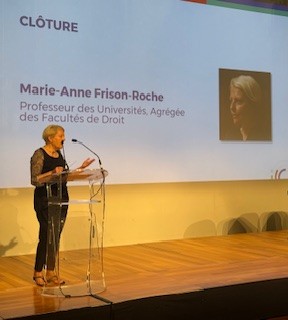
June 26, 2025
Editorial responsibilities : Direction of the collection "Cours-Série Droit privé", Editions Dalloz (33)
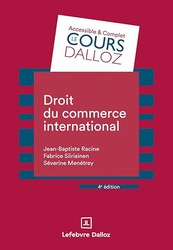
► Référence complète : J.B. Racine, F. Siiriairnen, S. Menétrey, Droit du commerce international, Dalloz, coll. "Cours Dalloz-Série Droit privé", 4ière éd., 2025, 410 p.
____
► Présentation de ce Cours : Ce Cours expose toutes les règles particulières du commerce international (vente, transport, distribution, etc.). Le droit du commerce international est devenu une discipline mise au cœur du processus de mondialisation de l'économie. Elle est donc en pleine expansion. Ce n'est pas seulement une branche du droit international privé.
Le droit du commerce international présente une autonomie certaine par son esprit, ses méthodes et son objet. Les sources de ce droit sont particulières dans la mesure où il fait la part belle aux usages du commerce international, plus généralement désignés sous l'appellation de lex mercatoria. Les acteurs du commerce international sont variés : il s'agit bien entendu des sociétés mais aussi des États . Le particularisme du droit du commerce international se situe aussi au stade des opérations du commerce international : la vente, le transport, la distribution, etc. obéissent à des règles particulières, le plus souvent des règles matérielles de source internationale. Enfin, l'importance et l'originalité du droit du commerce international se manifestent dans le recours à l'arbitrage. En tant que justice privée, l'arbitrage est aujourd'hui devenu le mode de résolution de droit commun des litiges du commerce international.
L'ouvrage s'adresse aux étudiants qui découvrent la matière ainsi qu'aux universitaires et praticiens. Il allie connaissances théoriques et orientations pratiques. Il ouvre sur une vision différente du droit, c'est-à-dire un droit partiellement dissocié de l'État. Il met aussi l'accent sur la nécessité de bâtir un droit répondant aux défis de la mondialisation.
____
📚Consulter l'ensemble de la collection dans laquelle l'ouvrage est publié
____
📚Sont directement corrélés à cet ouvrage :
🕴️B. Haftel, 📕Droit international privé
🕴️D. Mainguy, 📕Contrats spéciaux
________
June 25, 2025
Thesaurus : Doctrine
► Référence complète : A. Bauch, Le droit de l’entreprise à l’épreuve de la compliance, Thèse Université Toulouse Capitole 2025, 492 pages dactyl.
____
soutenue le 25 juin 2025.
🪑🪑🪑Membres du jury :
🕴🏻Lukas Rass-Masson, professeure à l'Université Toulouse-Capitole, directeur de la thèse
🕴🏻Sandrine Tisseyre, professeure à l'Université Toulouse- Capitole, rapporteure
🕴🏻Philippe Weller, professeure à l'Université d'Heidelberg, rapporteur
🕴🏻Caroline Coupet, professeure à l'Université Panthéon-Assas (Paris II)
🕴🏻Marie-Anne Frison-Roche
____
► Présentation de la thèse

June 25, 2025
Teachings : Participation à des jurys de thèses

🌐follow Marie-Anne Frison-Roche on LinkedIn
🌐subscribe to the Newsletter MAFR Regulation, Compliance, Law
🌐subscribe to the Video Newsletter MAFR Surplomb
🌐subscribe to the Newsletter MaFR Droit & Art
____
► Full Reference: M.-A. Frison-Roche, member of the jury for Annika Bauch's thesis, Le droit de l'entreprise à l'épreuve de la compliance (Company Law put to the test of Compliance), University of Toulouse, 5 June 2025, 2-5pm.
____
🪑🪑🪑Other members of the jury :
🕴🏻Lukas Rass-Masson, Professor at Toulouse-Capitole University, thesis supervisor
🕴🏻Sandrine Tisseyre, Professor at Toulouse-Capitole University,
🕴🏻Marc-Philippe Weller, Professor at the University of Heidelberg, Germany
🕴🏻Caroline Coupet, Professor at the Université Panthéon-Assas (Paris II)
____
► Presentation of the thesis: The thesis is based on French, American and German research. It is based on two perspectives.
The first part of the thesis describes the way in which Business Law feeds into Compliance, since it is within Business Law (and more particularly Company Law and the legal rules governing corporate bodies) that Compliance, which the author presented to have originated in the United States, has transformed the way in which companies must be managed, having to take into account the extra-financial dimension of their activity, which modifies the very notion of social interest and leads to the integration of stakeholders into the corporate functioning.
The second part of the thesis looks at the way in which Compliance has transformed Corporate Law, bringing with it new requirements, such as consideration of risks, regulatory mechanisms and ethical concerns, with the company itself becoming a vehicle for Compliance. This is achieved in particular by inserting compliance clauses into contracts, which is an appropriate but nevertheless limited tool for this compliance goal.
____
At the end of her defence, the candidate was awarded the degree of Doctor of Law and was informally congratulated by her jury on the quality of her work.
____
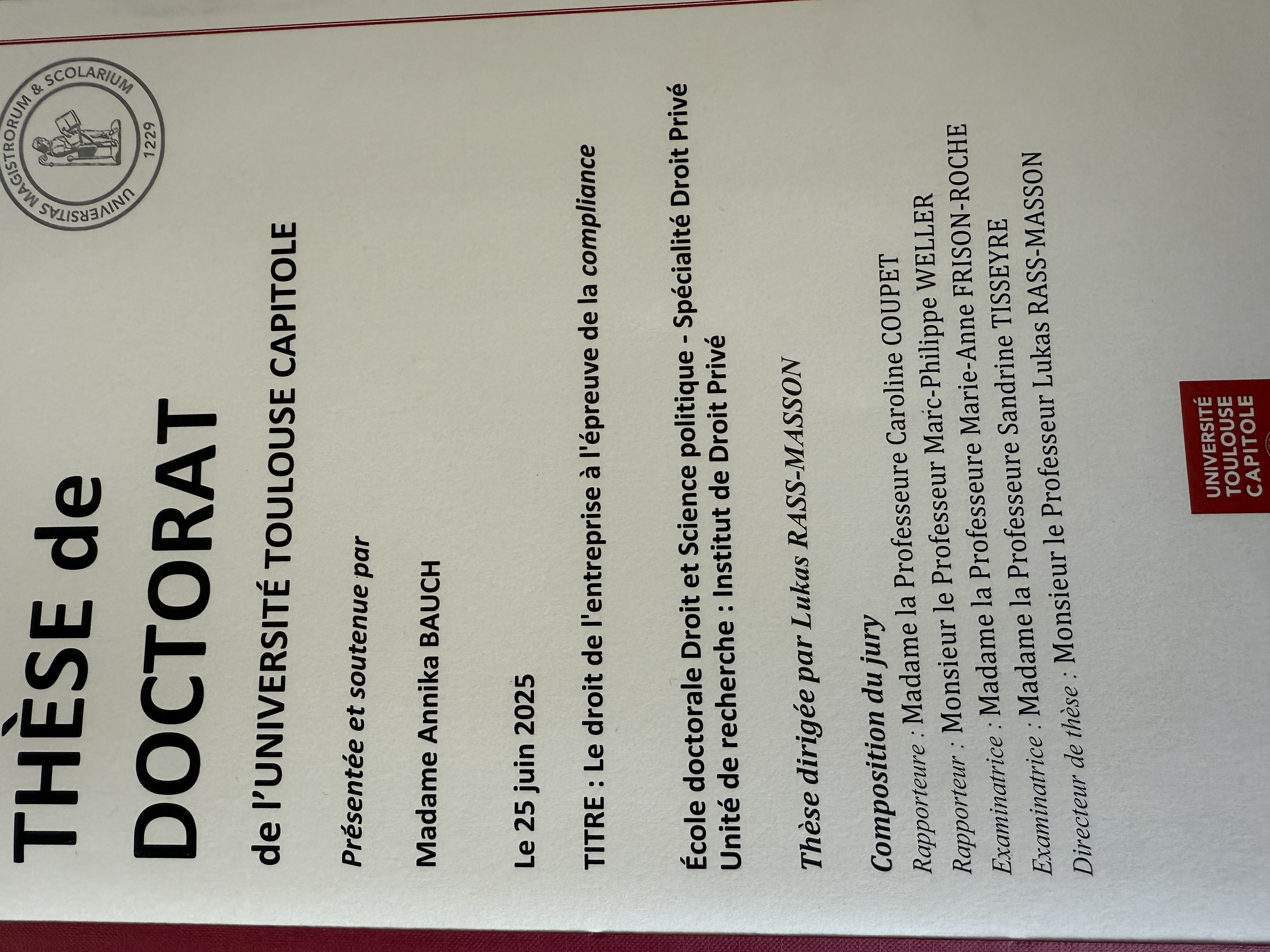
June 20, 2025
Thesaurus : Doctrine
Référence complète : Haut Comité Juridique de la Place de Paris, Les impacts juridiques et réglementaires de l'Intelligence Artificielle en matière bancaire, financière et des assurances, juin 2025.
_____
June 19, 2025
Thesaurus : Doctrine
► Référence complète : L. Rapp, "Équilibres instables. L'office du juge à l'épreuve du devoir de vigilance", AJDA, 2025, Etude, n01074.
____
🦉Cet article est accessible en texte intégral pour les personnes inscrites aux enseignements de la Professeure Marie-Anne Frison-Roche
________
June 19, 2025
Thesaurus : Doctrine
► Référence complète : M. S. Erie, "Compliance in China, in China in compliance, Wiley, 2025.
____
► Résumé de l'article (par l'auteur) : Much of scholarly writing on compliance is derived from the experiences of Western multi- national corporations operating in developed economies. This introduction to the special issue “China in Compliance” departs from such convention by asking how compliance works in China. By broadening the scope of compliance studies to include non- Western contexts, including China and its relationship to the “Global South” and nondemocratic settings, the special issue breaks new ground in the empirical analysis of compliance industries, practices, and professionals. The special issue is comprised of seven articles that illustrate specific compliance problems for compliance in Chinese overseas direct investment. This introduction first provides a detailed overview of the growth of domestic corporate compliance in China over the last several years and then puts this growth in the context of Chinese companies engaging in overseas projects. It subsequently gives a roadmap of the articles and highlights their key themes and findings. The broader goal is to provide a conceptual foundation for the comparative study of compliance.
____
🦉Cet article est accessible en texte intégral pour les personnes inscrites aux enseignements de la Professeure Marie-Anne Frison-Roche
________
June 19, 2025
Thesaurus : Doctrine
► Référence complète : Y. Broussole, "Professions libérales : vive les sociétés de participations pluri-professionnelles !", ActuJuridique, 19 juin 2025
____
____
► Résumé de l'article (fait par l'auteur) : "Le décret est pris en application de l’ordonnance n° 2023-77 du 8 février 2023 relative à l’exercice en société des professions libérales réglementées. Il fait suite aux cinq décrets du 14 août 2024 posant les conditions d’exercice en société des professions réglementées (avocat, notaire, commissaire de justice, greffier de tribunal de commerce et avocat au Conseil d’État et à la Cour de cassation). Ces professions peuvent désormais constituer des sociétés pluri-professionnelles d’exercice (SPE) pour exercer en commun leurs activités ou créer des sociétés de participations financières de professions libérales pluri-professionnelles (SPFP).".
________
June 19, 2025
Thesaurus : Autorité de Contrôle Prudentiel et de résolution (A.C.P.R.)
► Référence complète : ACPR, Comm. sanct., déc. n°2024-02, 19 juin 2025, Banque Delubac et Cie
____
_______
June 18, 2025
Thesaurus : 02. Cour de cassation
► Référence complète : Soc., 18 juin 2025, n°23-20.079, M c/ société MDC
____
____
Description de l'arrêt.
____
June 17, 2025
Thesaurus : 08. Juridictions du fond
► Référence complète : Paris, pôle 5, ch. 12, 17 juin 2025, RG n° 24-05193, S.A. La Poste
____
________
June 5, 2025
Thesaurus : Doctrine
► Référence complète : A. Supiot, "Droit du travail et dette de vie", Revue internationale du travail. 2025,165(1).
____
____

Updated: June 5, 2025 (Initial publication: June 20, 2024)
Publications

🌐follow Marie-Anne Frison-Roche on LinkedIn
🌐subscribe to the Newsletter MAFR Regulation, Compliance, Law
🌐subscribe to the Video Newsletter MAFR Surplomb
____
 ► Full Reference: M.-A. Frison-Roche, The will, the heart and the calculation, the three traits encercling the Compliance Obligation, March 2024.
► Full Reference: M.-A. Frison-Roche, The will, the heart and the calculation, the three traits encercling the Compliance Obligation, March 2024.
____
📝 This Working Paper is the basis for the contribution "The will, the heart and the calculation, the three traits encercling the Compliance Obligation", in📘Compliance Obligation.
____
► Summary of this Working Paper: There is often a dispute over the pertinent definition of Compliance Law, but the scale and force of the resulting obligation for the companies subject to it is clear. It remains difficult to define. First, we must not to be overwhelmed by the many obligations through which the Compliance Obligation takes shape, such as the obligation to map, to investigate, to be vigilant, to sanction, to educate, to collaborate, and so on. Not only this obligations list is very long, it is also open-ended, with companies themselves and judges adding to it as and when companies, sectors and cases require.
Nor should we be led astray by the distance that can be drawn between the contours of this Compliance Obligation, which can be as much a matter of will, a generous feeling for a close or distant other in space or time, or the result of a calculation. This plurality does not pose a problem if we do not concentrate all our efforts on distinguishing these secondary obligations from one another but on measuring what they are the implementation of, this Compliance Obligation which ensures that entities, companies, stakeholders and public authorities, contribute to achieving the Goals targeted by Compliance Law, Monumental Goals which give unity to the Compliance Obligation. Thus unified by the same spirit, the implementation of all these secondary obligations, which seem at once disparate, innumerable and often mechanical, find unity in their regime and the way in which Regulators and Judges must control, sanction and extend them, since the Compliance Obligation breathes a common spirit into them.
In the same way that the multiplicity of compliance techniques must not mask the uniqueness of the Compliance Obligation, the multiplicity of sources must not produce a similar screen. Indeed, the Legislator has often issued a prescription, an order with which companies must comply, Compliance then often being perceived as required obedience. But the company itself expresses a will that is autonomous from that of the Legislator, the vocabulary of self-regulation and/or ethics being used in this perspective, because it affirms that it devotes forces to taking into consideration the situation of others when it would not be compelled to do so, but that it does so nonetheless because it cares about them. However, the management of reputational risks and the value of bonds of trust, or a suspicious reading of managerial choices, lead us to say that all this is merely a calculation.
Thus, the contribution sets out to identify the Compliance Obligation by recognising the role of all these different sources. It emphasises that, in monitoring the proper performance of technical compliance obligations by Managers, Regulators and Judges, insofar as they implement the Compliance Obligation, it is pointless to limit oneself to a single source or to rank them abruptly in order of importance. The Compliance Obligation is part of the very definition of Compliance Law, built on the political ambition to achieve these Monumental Goals of preserving systems - banking, financial, energy, digital, etc. - in the future, so that human beings who cannot but depend on them are not crushed by them, or even benefit from them. This is the teleological yardstick by which the Compliance Obligation is measured, and with it all the secondary obligations that give it concrete form, whatever their source and whatever the reason why the initial standard was adopted.
In order to define Compliance's Obligation, the contribution endeavours to recognise the contribution of all these three sources: Will, Heart and Calculation.
_____
🔓read the developments below ⤵️
June 4, 2025
Publications
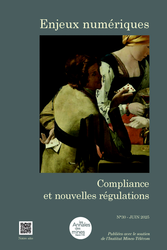
🌐follow Marie-Anne Frison-Roche on LinkedIn
🌐subscribe to the Newsletter MAFR Regulation, Compliance, Law
🌐subscribe to the Video Newsletter MAFR Surplomb
🌐subscribe to the Newsletter MaFR Droit & Art
____
► Full Reference: P. Bonis & M.-A. Frison-Roche, "Réguler le numérique, ou Sisyphe heureux" (Regulating Digital, or a happy Sisyphus), in P. Bonis & L. Castex (dir.), Compliance et Nouvelles Régulations, Les Annales des Mines, series "Enjeux numériques, June 2025, p.5-7.
____
📝read the article (in French)
____
📗read the table of content of this special issue of Enjeux numérique, Régulation et Compliance (in French), in which this introductory article is published.
____
► English Summary of this article: This introduction to the collective publication on Regulation and Compliance, which aims to bring order to the Digital space, takes up the idea expressed by Camus when he referred to 'happy' Sisyphus, and expresses the idea that Regulation and Compliance are applied to this area with difficulty, relentlessness and failure, with texts constantly being adopted, modified and amplified on all sides, while the Digital Space is constantly changing, and the slope is constantly being climbed again. But this should not be seen as a failure, not even a flaw, because it is in the nature of digital regulation to always place the regulatory apparatus on our shoulders.
This weight is shared by all, by the Authorities of all countries, because there is something common to all and also because there is something specific for each, because the techniques differ and because the visions of the world that the Politicians print in the texts and project in the Digital will always differ. This weight is also shared by companies, which internalise the rules through Compliance mechanisms, making them necessary agents for the efficiency and sustainability of the digital system, but also players in it, in articulation with Internet users in a permanent and unstable articulation with the local to the finest and this global that the Internet has invented.
This presentation opens the series of contributions to the collective publication Régulation et Compliance, which makes up this special issue of Enjeux numériques in Annales des Mines.
____
🌐read also the English presentation of:🕴️Marie-Anne Frison-Roche, 📝Le Droit de la compliance, voie royale pour réguler l'espace numérique (Compliance Law as a Royal Road for regulating the Digital Space)
________
June 4, 2025
Publications

🌐follow Marie-Anne Frison-Roche on LinkedIn
🌐subscribe to the Newsletter MAFR Regulation, Compliance, Law
🌐subscribe to the Video Newsletter MAFR Surplomb
🌐subscribe to the Newsletter MaFR Droit & Art
____
 ► Full Reference: M.-A. Frison-Roche, "Le Droit de la compliance, voie royale pour réguler l'espace numérique" (Compliance Law as a Royal Road for regulating the Digital Space), in P. Bonis et L. Castex (dir.), Compliance et nouvelles régulation, Annales des Mines, coll. "Enjeux numériques", juin 2025, pp.69-77.
► Full Reference: M.-A. Frison-Roche, "Le Droit de la compliance, voie royale pour réguler l'espace numérique" (Compliance Law as a Royal Road for regulating the Digital Space), in P. Bonis et L. Castex (dir.), Compliance et nouvelles régulation, Annales des Mines, coll. "Enjeux numériques", juin 2025, pp.69-77.
____
📝 read the article (in French)
____
🚧This article is underpinned by a English Working Paper in English, with additional technical developments and hypertext links. : Compliance Law as a Royal Road for regulating the Digital Space
____
► English Summary of this article: In order to describe the role of Compliance Law in regulating the digital space and to conclude that this new branch of Law is the 'royal road' to this end, this study proceeds in 6 stages.
Firstly, at first sight and conceptually, there is a gap between the political idea of Regulating and the ideas (freedom and technology as 'law') on which the digital space has been built and is unfolding.
Secondly, in practice, there is such a huge gap between the ordinary methods of Regulatory Law, which are backed by a State, and the organisation of the Digital Space by these economic operators, that are both American and global.
Thirdly, the political claim to civilise the Digital Space remains and is growing, relying on the very strength of the entities capable of realising this ambition, these entities being the crucial digital operators themselves, seized as Ex Ante.
Fourthly, it corresponds to the conception and practice of a new branch of Law, Compliance Law, which should not be confused with "conformity" and which is normatively anchored in its "Monumental Goals".
Fifthly, Compliance Law internalises Monumental Goals in the digital operators which disseminate them through structures and behaviours in the digital space.
Sixthly, through the interweaving of legislation, court rulings and corporate behaviour, the Monumental Goals are given concrete expression, willingly or by force, in ways that can civilise the digital space without undermining the primacy of freedom.
____

May 31, 2025
Publications

🌐follow Marie-Anne Frison-Roche on LinkedIn
🌐subscribe to the Newsletter MAFR Regulation, Compliance, Law
🌐subscribe to the Video Newsletter MAFR Surplomb
🌐subscribe to the Newsletter MaFR Droit & Art
____
 ► Full Reference : M.-A. Frison-Roche, To master the regulatory mass of Compliance, think of it as a jigsaw puzzle, Working Paper , May 2025
► Full Reference : M.-A. Frison-Roche, To master the regulatory mass of Compliance, think of it as a jigsaw puzzle, Working Paper , May 2025
____
📝 This Working Paper underpins the Newsletter MAFR Law -Compliance - Regulation of 2 June 2025 :
____
► Summary of this Working Paper: People are rightly complaining that Europe's regulatory and compliance regulations are too numerous, too complicated and too changeable. As a result, they are said to be unmanageable.
Three solutions are proposed: specialise lawyers, regulatory corpus by regulatory corpus; deregulate; entrust everything to algorithms.
These are inadequate solutions, because regulations cannot be understood unless they are put into perspective with the rest of the legal rules .; we have entered a new world, and these new regulations reflect the need for a new Law (unless we want to destroy the Law itself, which is what some people are dreaming of doing); algorithms reproduce past solutions and do not produce the new legal conception required.
For an appropriate solution, we need to move away from a word-by-word understanding of the regulatory and compliance regulations and understand them as a whole, not only in relation to the purpose that gives them meaning, but also in relation to each other. In the positive sense of the term, they form a European 'jigsaw puzzle'. We need to look at the overall picture in which each regulation fits and makes sense. It finds its simplicity in relation to its purpose.
It is always a question of working towards the sustainability of systems by asking companies to contribute so that the systems do not crush human beings but benefit them. Thus, in practice, the Monumental Goals of Compliance Law give clarity to the body of regulations which, when seen as a whole, are manageable and practical. Judges interpret them in this way.
____
🔓read the Working Paper below⤵️
May 28, 2025
Publications

🌐follow Marie-Anne Frison-Roche on LinkedIn
🌐subscribe to the Newsletter MAFR Regulation, Compliance, Law
🌐subscribe to the Video Newsletter MAFR Surplomb
____
► Full Reference: M.A. Frison-Roche, "100 fois remettre la Compliance sur le métier de la Stratégie" (100 times put Compliance back on the Strategy agenda), in Lettre d'information Compliance. Groupe SNCF, 100ième issue, 28 may 2025.
____
📝read the article (in French)
____
► English presentation of this article: This anniversary article sets out what Compliance is and should be in a large group. It expresses it in 4 points:
1. Actively master regulations by understanding their spirit
2. Improving risk detection without taking away the entrepreneurial spirit
3. Promoting convergence and managing conflict
4. Strengthen the company's identity by focusing on its strategic ambitions
________
May 20, 2025
Thesaurus : Doctrine
► Référence complète : I. Urbain-Parléani, Présentation de la Directive CSRD, in dossier spéc., I. Urbain-Parléani (dir.), La transposition de la directive CSRD, Revue Banque, janv. 2025, p.7-
____
📗lire une présentation générale de l'ouvrage, La transposition de la directive CSRD, dans lequel cet article est publié
________
May 15, 2025
Publications
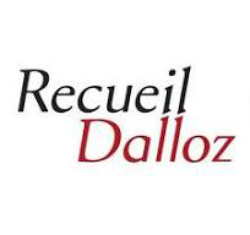
► Full Reference : M.A. Frison-Roche, Le "Grand Arrêt" de la Cour d'appel de Paris du 7 mai 2025, Dalloz et al. c/Forseti, D.2025, p.
____
📝reread the article (in French)
____
► Ench presentation of this article: The first part of the article describes the Paris Court of Appeal's ruling against the company that created a Legaltech platform under the trade name 'Doctrine', which offers a large number of court rulings, particularly from lower courts. Sued for unfair competition by a group of publishers offering a similar service, they were not convicted at first instance, but were convicted by the Court of Appeal because it appeared that they had fraudulently obtained thousands of judgments, which, under Civil Law, constitutes unfair competition to the detriment of the plaintiffs.
The second part of the article draws 6 lessons from this. The power of general law. On the benefits that the perpetrator has derived from the slowness of justice. On the importance of Open Data. On the fact that the law is not mastered by accumulating data but by putting it into perspective through the thinking of authors and publishers. On the indifference for this of the financiers who built and resold the "Doctrine" website. On the very nature of a 'Grand Arrêt', such as this one.
________